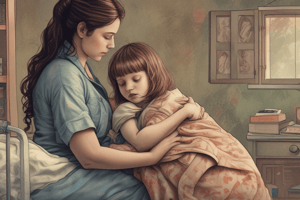Podcast
Questions and Answers
Which type of child maltreatment involves psychological harm?
Which type of child maltreatment involves psychological harm?
- Emotional Abuse (correct)
- Physical Abuse
- Neglect
- Sexual Abuse
What is the primary focus of child welfare in pediatrics?
What is the primary focus of child welfare in pediatrics?
- Treating childhood illnesses
- Conducting research on child development
- Providing education on pediatric health issues
- Ensuring children receive proper care and protection from harm (correct)
What is a common behavioral sign of child maltreatment?
What is a common behavioral sign of child maltreatment?
- Frequent visits to the pediatrician
- Increased appetite
- Changes in behavior, such as fear or anxiety (correct)
- Improved self-esteem
What is a key component of a pediatrician's role in identifying child maltreatment?
What is a key component of a pediatrician's role in identifying child maltreatment?
What is a prevention strategy for child maltreatment?
What is a prevention strategy for child maltreatment?
What is the primary goal of home visitation programs in promoting child welfare?
What is the primary goal of home visitation programs in promoting child welfare?
What is the role of pediatricians in collaboration with Child Protective Services (CPS)?
What is the role of pediatricians in collaboration with Child Protective Services (CPS)?
Why is cultural awareness important for pediatricians in promoting child welfare?
Why is cultural awareness important for pediatricians in promoting child welfare?
What is a key component of pediatricians' role in promoting child welfare?
What is a key component of pediatricians' role in promoting child welfare?
What is the outcome of CPS investigation in cases of suspected child maltreatment?
What is the outcome of CPS investigation in cases of suspected child maltreatment?
Flashcards are hidden until you start studying
Study Notes
Child Welfare in Pediatrics
Definition and Importance
- Child welfare refers to the well-being and safety of children, ensuring they receive proper care and protection from harm.
- Pediatricians play a crucial role in identifying and reporting suspected child abuse and neglect.
Types of Child Maltreatment
- Physical Abuse: intentional physical harm or injury, such as bruises, burns, or fractures.
- Emotional Abuse: psychological harm, such as yelling, belittling, or intimidation.
- Sexual Abuse: any form of sexual exploitation or inappropriate contact.
- Neglect: failure to provide basic needs, such as food, shelter, or medical care.
Signs and Symptoms of Child Maltreatment
- Physical: unexplained injuries, frequent absences, or lack of medical care.
- Behavioral: changes in behavior, such as fear, anxiety, or aggression.
- Emotional: delayed development, poor self-esteem, or difficulty trusting others.
Pediatrician's Role in Identifying Child Maltreatment
- Screening: ask about family dynamics, discipline methods, and child's emotional well-being.
- Observation: look for signs of abuse or neglect during physical exams.
- Reporting: mandatory reporting laws require pediatricians to report suspected child maltreatment to authorities.
Prevention and Intervention Strategies
- Parenting Education: provide guidance on positive discipline techniques and child development.
- Home Visitation Programs: connect families with community resources and support.
- Counseling and Therapy: offer individual and family therapy to address underlying issues.
Collaboration with Child Protective Services (CPS)
- Reporting: pediatricians report suspected child maltreatment to CPS.
- Investigation: CPS investigates reports and develops a plan for the child's safety.
- Collaboration: pediatricians work with CPS to ensure the child's medical and emotional needs are met.
Cultural Competence and Child Welfare
- Cultural Awareness: pediatricians should be aware of cultural differences in parenting practices and child-rearing beliefs.
- Sensitivity: approach families with sensitivity and respect for their cultural background.
Conclusion
- Pediatricians play a vital role in identifying and reporting child maltreatment, as well as providing prevention and intervention strategies to promote child welfare.
Studying That Suits You
Use AI to generate personalized quizzes and flashcards to suit your learning preferences.




